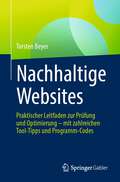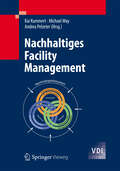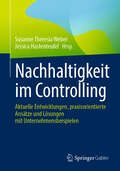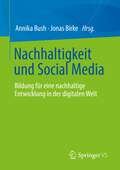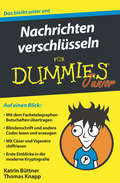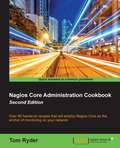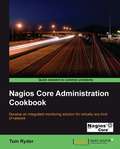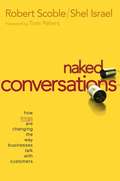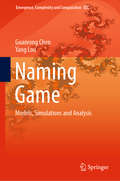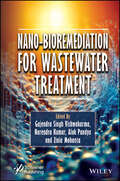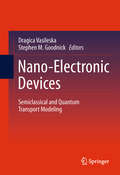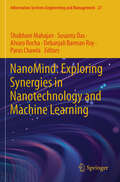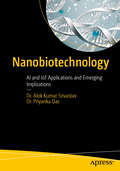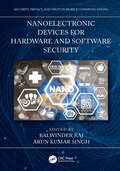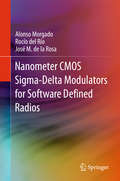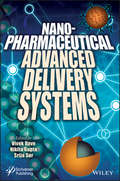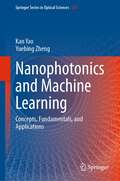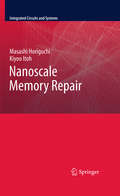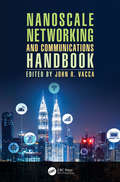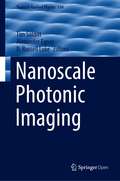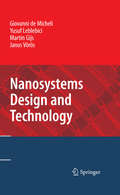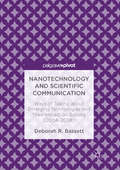- Table View
- List View
Nachhaltige Websites: Praktischer Leitfaden zur Prüfung und Optimierung – mit zahlreichen Tool-Tipps und Programm-Codes
by Torsten BeyerDieses Buch bietet einen praktischen Leitfaden für das Design, die Entwicklung und den Betrieb energieeffizienter Webseiten. Torsten Beyer hat eine konkrete Schritt-für-Schritt-Anleitung entwickelt, die zur Optimierung bestehender Seiten als auch vor dem Website-Relaunch nutzbar ist. Dabei werden die Ziele und Ansätze diverser Initiativen, u.a. die SDG-Klimaziele der Vereinten Nationen, die Prinzipien der Corporate Digital Responsibility und das von Web-Designern formulierte Sustainable Web Manifesto berücksichtigt.Durch die Optimierung von Bildern, Videos, Schriften, Skripten und Seitentemplates sowie der Konfiguration des Webservsers lässt sich das Datenvolumen mit einfachen Mitteln und ohne Qualitätseinbußen substanziell reduzieren. Als Nebeneffekt werden die Ladezeiten geringer, was zu besseren Rankings in Suchmaschinen und einer höheren Nutzerzufriedenheit führt. Kostenersparnis, Ranking-Verbesserungen und CO2-Optimierungen können somit Hand-in-Hand gehen.Aus dem InhaltAnalyse des CO2-Fußabdrucks von WebsitesSchritt-für-Schritt-Optimierung: von der Konfiguration des Webservers über Bilder, Icons und Animationen sowie Schriften, CSS, Video-, Audio- und PDF-Dateien, JavaScript und HTML-DateienMit zahlreichen kleinen Programmcode-Tipps zur schnellen Optimierung. Plus erprobte und häufig kostenlose Tool-Tipps zur Prüfung und Optimierung Ihrer WebsiteDas Buch zeigt mit seinen vielfältigen praktischen Tipps, wie Internetseiten selbst mit kostenlosen Hilfsmitteln nachhaltiger und datensparsamer gestaltet werden können. Es richtet sich gleichermaßen an die Betreiber von Webseiten als auch an Agenturen.
Nachhaltiges Facility Management
by Andrea Pelzeter Kai Kummert Michael MayUm Nachhaltigkeit im Facility Management zu realisieren, sind praxisgerechte Bezugsgrößen erforderlich. Die Autoren stellen in dem Band eine Definition der Nachhaltigkeit vor, die auf Kennzahlen für das Facility Management basiert und die sie in Kooperation mit Unternehmen erarbeitet haben. Anhand eines IT-gestützten Systems werden die flexible Erfassung, Verwaltung, Messung und Auswertung von Nachhaltigkeitskennzahlen im Unternehmen dargestellt und das Tool in seinen Kernfunktionen beschrieben.
Nachhaltigkeit im Controlling: Aktuelle Entwicklungen, praxisorientierte Ansätze und Lösungen mit Unternehmensbeispielen
by Susanne Theresia Weber Jessica HastenteufelDie Beiträge dieses Praktikerbuchs erläutern die Potenziale und Herausforderungen der Nachhaltigkeit für das Controlling anhand von Fallstudien und/oder von in der Praxis erprobten Ansätzen und Lösungen. Sie richten sich primär an Controller*innen und Personen im Management, die Nachhaltigkeitscontrolling zur Optimierung des Unternehmenserfolgs einsetzen möchten, entweder aus der Perspektive des gesamten Unternehmens oder aus der Perspektive spezifischer Abteilungen und Prozesse. Die verschiedenen Beiträge beleuchten den in der Praxis nicht immer einfachen Prozess der Implementierung nachhaltiger Lösungen und unterstützen Unternehmen dabei, das Controlling und Reporting ihrer Nachhaltigkeitsstrategien erfolgreich umzusetzen. Dieser Sammelband stellt den dritten Teil zu wesentlichen Themen im Controlling dar. Das erste Werk „Branchenspezifisches Controlling“ bezieht sich auf bedeutsame Entwicklungen im Controlling in unterschiedlichen Branchen. Das zweite Buch „Digitale Transformation im Controlling“ präsentiert relevante Trends zur Digitalisierung im Controlling. Das vorliegende dritte Werk beschäftigt sich als logische Fortsetzung mit dem aktuellen Thema der Nachhaltigkeit aus der Controlling-Perspektive.
Nachhaltigkeit und Social Media: Bildung für eine nachhaltige Entwicklung in der digitalen Welt
by Annika Bush Jonas BirkeDas Konzept der Nachhaltigkeit erfährt in den letzten Jahren zunehmend Aufmerksamkeit in allen Lebensbereichen. Ob es um Stories zum Klimaschutz auf Instagram, Erklärvideos zur Kreislaufwirtschaft auf YouTube oder Tweets zur Armutsbekämpfung auf Twitter geht - längst hat das Thema auch Einzug in die aufmerksamkeitsstarke Welt von Social Media gefunden. Diese bieten bisher nie dagewesene Möglichkeiten der digitalen Vernetzung und des informellen Lernens. Dadurch rücken sie Nachhaltigkeit verstärkt aus der wissenschaftlichen Nische in den öffentlichen Diskurs.Dieser Sammelband verbindet die bisher zumeist getrennt gedachten Bereiche Nachhaltigkeit und Social Media. Welche nachhaltigen Themen dominieren in den sozialen Netzwerken? Wie werden diese in Facebook rezipiert und auf YouTube diskutiert? Welchen Einfluss hat die Darstellung von ressourcenschonendem Verhalten bei Instagram auf den privaten Alltag? Diesen und weiteren spannenden Fragen wird in diesem Kompendium auf den Grund gegangen. Zwölf innovative Beiträge aus unterschiedlichen Fachdisziplinen untersuchen verschiedene Social Media hinsichtlich der Darstellung und Kommunikation von Nachhaltigkeitsthemen und zeigen, welche Chancen, aber auch welche Herausforderungen sich durch die Verbindung beider Themenkomplexe ergeben. Damit wird ein Beitrag zum wissenschaftlichen und gesellschaftlichen Diskurs beider Bereiche geleistet und die Nachhaltigkeitsforschung im digitalen Raum gestärkt.
Nachrichten verschlüsseln für Dummies Junior (Für Dummies)
by Katrin Buttner Thomas KnappWenn du mit deinem Smartphone eine Nachricht versendest, möchtest du, dass niemand mitliest oder mitkriegt, worum es geht. Deine Nachrichten sollen privat bleiben. Nachrichten über größere Entfernungen zu übermitteln und Nachrichten unter Verschluss zu halten, war den Menschen schon immer wichtig. In diesem Buch erfährst du, welche Lösungen man dafür gefunden hat; vom historischen Fackeltelegraf über die Vigenère-Verschlüsselung bis hin zum heute eingesetzten RSA-Kryptosystem. Bestens geeignet für Kinder und Jugendliche ab 10 Jahre.
Nagios Core Administration Cookbook - Second Edition
by Tom RyderOver 90 hands-on recipes that will employ Nagios Core as the anchor of monitoring on your network About This Book * Master the advanced configuration techniques of Nagios Core to model your network better by improving hosts, services, and contacts * Filter and improve the notifications that Nagios Core sends in response to failed checks, which can greatly assist you when diagnosing problems * Pull Nagios Core's data into a database to write clever custom reports of your own devise Who This Book Is For If you are a network or system administrator and are looking for instructions and examples on working with Nagios Core, then this book is for you. Some basic shell command-line experience is required, and some knowledge of scripting would be helpful when we discuss how plugins work. What You Will Learn * Manage the configuration of Nagios Core with advanced techniques to achieve fine detail in your checks * Find, install, and even write your own check plugins * Filter notifications to send them to the right people or programs at the right time * Work around difficult network accessibility issues and delegate checks to other machines * Tweak a Nagios Core server to achieve both high performance and redundancy in case of disaster * Process the results of checks performed by other machines to monitor backups and similar processes * Extend Nagios Core to allow advanced scripting, reporting, and network visualization behavior In Detail Nagios Core is an open source monitoring framework suitable for any network that ensures both internal and customer-facing services are running correctly and manages notification and reporting behavior to diagnose and fix outages promptly. It allows very fine configuration of exactly when, where, what, and how to check network services to meet both the uptime goals of your network and systems team and the needs of your users. This book shows system and network administrators how to use Nagios Core to its fullest as a monitoring framework for checks on any kind of network services, from the smallest home network to much larger production multi-site services. You will discover that Nagios Core is capable of doing much more than pinging a host or to see whether websites respond. The recipes in this book will demonstrate how to leverage Nagios Core's advanced configuration, scripting hooks, reports, data retrieval, and extensibility to integrate it with your existing systems, and to make it the rock-solid center of your network monitoring world. Style and approach Each chapter contains a set of step-by-step recipes to perform an example of a commonly performed task related to network administration. The book begins by focusing closely on the properties and configuration of Nagios Core itself, and gradually moves on to other pieces of software that can support, manage, and extend the system.
Nagios Core Administrators Cookbook
by Tom RyderThis book is written in Cookbook style, beginning with recipes based on basic structure which gradually progresses towards using Nagios Core as a monitoring framework. This book is for System Administrators who are looking for recipes to help them deal with advanced network monitoring issues with Nagios Core.
Nagios, 2nd Edition: System and Network Monitoring
by Wolfgang BarthGood system administrators recognize problems long before anyone asks, "Hey, is the Internet down?" Nagios, an open source system and network monitoring tool, has emerged as the most popular solution for sys admins in organizations of all sizes. It's robust but also complex, and Nagios: System and Network Monitoring, 2nd Edition, updated to address Nagios 3.0, will help you take full advantage of this program.Nagios, which runs on Linux and most *nix variants, can be configured to continuously monitor network services such as SMTP, POP3, HTTP, NNTP, SSH, and FTP. It can also supervise host resources (processor load, disk and memory usage, running processes, log files, and so on) and environmental factors, such as temperature and humidity. This book is your guide to getting the most out of this versatile and powerful monitoring tool.Inside Nagios, you’ll learn how to:–Install and configure the Nagios core, all standard plugins, and selected third-party plugins–Configure the notification system to alert you of ongoing problems—and to alarm others in case of a serious crisis–Program event handlers to take automatic action when trouble occurs–Write Perl plugins to customize Nagios for your unique needs–Quickly understand your Nagios data using graphing and visualization tools–Monitor Windows servers, SAP systems, and Oracle databasesThe book also includes a chapter that highlights the differences between Nagios versions 2 and 3 and gives practical migration and compatibility tips. Nagios: System and Network Monitoring, 2nd Edition is a great starting point for configuring and using Nagios in your own environment.
Nakar y la noche de retos extremos
by Nakar¡Únete a Nakar y Arta y vive con ellos el reto MÁXIMO! ATRAPADOS. EN EL PARQUE DE ATRACCIONES. DE NOCHE.¿Qué puede salir mal? Nakar y sus amigos se han quedado encerrados en el parque y lo tienen claro: ¡ES SU OPORTUNIDAD PARA PROBAR TODAS LAS ATRACCIONES! Pero pronto empiezan a suceder cosas extrañas: parece que hay alguien más por la zona, se escuchan ruidos sospechosos y, lo peor, ¡sus amigos van desapareciendo uno a uno!¿QUÉ ESTÁ PASANDO? Nakar tendrá que descubrir el SECRETO MÁXIMO del parque de atracciones. ¿Lo acompañas en su aventura más loca?
Naked Conversations: How Blogs Are Changing the Way Businesses Talk with Customers
by Robert Scoble Shel IsraelScoble and coauthor Israel argue that every business can benefit from smart "naked" blogging, whether the company's a small town plumbing operation or a multinational fashion house. "If you ignore the blogosphere... you won't know what people are saying about you," they write. "You can't learn from them, and they won't come to see you as a sincere human who cares about your business and its reputation." To bolster their argument, Scoble and Israel have assembled an enormous amount of information about blogging: from history and theory to comparisons among countries and industries. They also lay out the dos and don'ts of the medium and include extensive statistics, dozens of case studies and several interviews with famous bloggers.
Naked in the Rideshare: Stories of Gross Miscalculations
by Rebecca Shaw Ben KronengoldFrom Rebecca Shaw and Ben Kronengold, the youngest comedy writers ever for The Tonight Show Starring Jimmy Fallon and masterminds behind the viral 2018 Yale graduation speech, comes a hilarious collection of short stories taking on coming-of-age, memes, sex, politics, relationships, and Goop, with satire, self-deprecation, and utter irreverence.Showing off their trademark humor and writing chops that have made them a viral sensation, Rebecca Shaw and Ben Kronengold provide a collection of startlingly funny short stories that will keep readers laughing.Naked in the Rideshare is a riotous collection of comedic short stories, bursting with the safe spaces, shrooms dealers, and Notes app apologies that define growing up right now. The essays take a drunken cannonball into this generation’s hopes and anxieties. A camp color war ends in ritual sacrifice. A twenty-something enters a sexual relationship with his childhood fairy god milf. A summit outside of space and time brings together a teen's selves from ages 1 to 81.Irreverent, disturbing, and surprisingly rife with hope, Naked in the Rideshare aims to shine a light on the generation we can’t stop talking about—and all the ways we get them so wrong.
Naming Game: Models, Simulations and Analysis (Emergence, Complexity and Computation #34)
by Guanrong Chen Yang LouThis book provides a gradual introduction to the naming game, starting from the minimal naming game, where the agents have infinite memories (Chapter 2), before moving on to various new and advanced settings: the naming game with agents possessing finite-sized memories (Chapter 3); the naming game with group discussions (Chapter 4); the naming game with learning errors in communications (Chapter 5) ; the naming game on multi-community networks (Chapter 6) ; the naming game with multiple words or sentences (Chapter 7) ; and the naming game with multiple languages (Chapter 8). Presenting the authors’ own research findings and developments, the book provides a solid foundation for future advances. This self-study resource is intended for researchers, practitioners, graduate and undergraduate students in the fields of computer science, network science, linguistics, data engineering, statistical physics, social science and applied mathematics.
Nano-Bioremediation for Wastewater Treatment
by Narendra Kumar Gajendra Singh Vishwakarma Alok Pandya Zinia MohantaInvest in Nano-Bioremediation for Wastewater Treatment to explore cutting-edge techniques that combine nanotechnology and bioremediation, equipping you with innovative solutions and expert insights needed to tackle global environmental pollution challenges effectively. The coupling of nanotechnology and bioremediation techniques holds great promise for addressing environmental pollution and contamination on a global scale. The process of bioremediation uses living organisms, such as bacteria, fungi, or plants, to degrade or detoxify pollutants in the environment. Nanotechnology involves manipulating materials at the nanoscale, typically at the scale of individual atoms and molecules, to create novel properties and functionalities. Today, research is focused on exploring the combined potential of nanomaterials and bioremediation for treating pollutants. Nano-Bioremediation for Wastewater Treatment will serve as a premier guide for nanotechnology in this field, providing information regarding the various challenges that arise from the coupling of nanotechnology and bioremediation techniques. Since very limited literature is available on this subject, the editors have compiled all the current assays and techniques that provide insights into this topic. This book will also cover different fabrication methods and methods for decorating microbial cells on the surface of nanomaterials, which is a key factor for synthesizing microbial conjugation, as well as prototype designing and integrating developed materials into water purification systems. Unlock the potential of cutting-edge nano-bioremediation techniques for wastewater treatment, with practical applications, expert insights, and sustainable solutions that set you apart in the field. Audience Environmental engineers, chemists, biotechnologists, microbiologists, nanotechnologists, environmental consultants, researchers, academics, and policymakers focused on developing and implementing innovative solutions for wastewater treatment and environmental remediation.
Nano-Electronic Devices
by Stephen M. Goodnick Dragica VasileskaThis book surveys the advanced simulation methods needed for proper modeling of state-of-the-art nanoscale devices. It systematically describes theoretical approaches and the numerical solutions that are used in explaining the operation of both power devices as well as nano-scale devices. It clearly explains for what types of devices a particular method is suitable, which is the most critical point that a researcher faces and has to decide upon when modeling semiconductor devices.
NanoMind: Exploring Synergies in Nanotechnology and Machine Learning (Information Systems Engineering and Management #27)
by Alvaro Rocha Shubham Mahajan Paras Chawla Susanta Das Debanjali Barman RoyNanoMind" serves as a captivating exploration at the crossroads of nanotechnology and machine learning, revealing the profound synergies between these two groundbreaking fields. At its core, the book is a guided tour through the intricate realms of nanoscale materials and artificial intelligence, illuminating their combined potential to reshape the landscape of innovation. The journey begins with an introductory chapter, setting the stage for the convergence of nanotechnology and machine learning. Readers are introduced to the fundamental principles and applications of nanoscale materials, laying the groundwork for a deeper understanding of the nano-world. Simultaneously, the basics of machine learning are demystified, providing a comprehensive overview of the methodologies and concepts that underpin AI. "Nanoscale Sensing and Imaging" takes readers into the realm of advanced technologies, showcasing how machine learning enhances our ability to sense and image materials at the nanoscale. The narrative then seamlessly transitions to the creation and optimization of materials with nano-enhancements in "Nano-Enabled Materials." This section demonstrates how the marriage of nanotechnology and machine learning can lead to the development of materials with unprecedented properties, fostering innovation in diverse industries. The exploration extends into the field of healthcare with "Machine Learning in Nanomedicine," unveiling how AI at the nanoscale is transforming diagnostics, drug delivery, and personalized medicine. "Quantum Computing and Nanotechnology" delves into the cutting-edge intersection of quantum computing, nanotech, and machine learning, showcasing the potential for revolutionary advancements in computation and problem-solving. However, the journey isn't without its challenges. The book devotes a section to "Challenges and Ethical Considerations," addressing the complexities and ethical dimensions associated with the convergence of nanotechnology and machine learning. This discussion ensures that readers are equipped to navigate the ethical landscape responsibly.
Nanobiotechnology: AI and IoT Applications and Emerging Implications
by Dr. Alok Srivastav Dr. Priyanka DasExplore the integration of nanotechnology with artificial intelligence (AI) and the Internet of Things (IoT), focusing on advancements, applications, and future prospects in the field. This book highlights the fusion of cutting-edge technologies with biological and nanomaterials, emphasizing their role in transforming industries such as medicine, environmental science, and manufacturing. This book delves into the fundamentals of Nano-Biotechnology, starting with its historical evolution and foundational concepts. It explores the various types of nanomaterials, such as quantum dots, polymeric nanoparticles, and metal nanoparticles, detailing their properties and applications in fields such as drug delivery, diagnostics, and catalysis. Cellular nanostructures, biomolecular motors, and bio-inspired nanostructures are discussed, alongside methods for nanomaterial synthesis, including physical, chemical, and biological approaches. A focus on AI and IoT integration is woven throughout, highlighting their roles in optimizing nanomaterial properties, synthesis processes, and applications. The book further explores nanomaterial characterization techniques, nanomedicine, water remediation, MEMS/NEMS, and nanocatalysis, while also addressing crucial topics such as environmental impact, ecotoxicology, and regulatory frameworks. Each chapter presents advanced technological insights, from nanobiocatalysts to thin films and self-assembled nanostructures, all within the context of AI and IoT-driven advancements. You will gain a deep understanding of the interdisciplinary nature of Nano-Biotechnology, the implications of AI and IoT integration, and the ethical, environmental, and societal considerations shaping the future of this rapidly evolving field. The book offers valuable perspectives on emerging trends and equips readers with insights necessary for both academic and practical applications of Nano-Biotechnology. You Will Understand the key concepts, classification, properties, and applications of various nanomaterials in fields like medicine, diagnostics, and catalysis Gain insights into the physical, chemical, and biological methods of nanomaterial synthesis as well as advanced techniques <span style
Nanoelectronic Devices for Hardware and Software Security (Security, Privacy, and Trust in Mobile Communications)
by Arun Kumar Singh Balwinder RajNanoelectronic Devices for Hardware and Software Security has comprehensive coverage of the principles, basic concepts, structure, modeling, practices, and circuit applications of nanoelectronics in hardware/software security. It also covers the future research directions in this domain. In this evolving era, nanotechnology is converting semiconductor devices dimensions from micron technology to nanotechnology. Nanoelectronics would be the key enabler for innovation in nanoscale devices, circuits, and systems. The motive for this research book is to provide relevant theoretical frameworks that include device physics, modeling, circuit design, and the latest developments in experimental fabrication in the field of nanotechnology for hardware/software security. There are numerous challenges in the development of models for nanoscale devices (e.g., FinFET, gate-all-around devices, TFET, etc.), short channel effects, fringing effects, high leakage current, and power dissipation, among others. This book will help to identify areas where there are challenges and apply nanodevice and circuit techniques to address hardware/software security issues.
Nanometer CMOS Sigma-Delta Modulators for Software Defined Radio
by Rocío Del Río José M. Rosa Alonso MorgadoThis book presents innovative solutions for the implementation of Sigma-Delta Modulation (SDM) based Analog-to-Digital Conversion (ADC), required for the next generation of wireless hand-held terminals. These devices will be based on the so-called multi-standard transceiver chipsets, integrated in nanometer CMOS technologies. One of the most challenging and critical parts in such transceivers is the analog-digital interface, because of the assorted signal bandwidths and dynamic ranges that can be required to handle the A/D conversion for several operation modes. This book describes new adaptive and reconfigurable SDM ADC topologies, circuit strategies and synthesis methods, specially suited for multi-standard wireless telecom systems and future Software-defined-radios (SDRs) integrated in nanoscale CMOS. It is a practical book, going from basic concepts to the frontiers of SDM architectures and circuit implementations, which are explained in a didactical and systematic way. It gives a comprehensive overview of the state-of-the-art performance, challenges and practical solutions, providing the necessary insight to implement successful design, through an efficient design and synthesis methodology. Readers will learn a number of practical skills - from system-level design to experimental measurements and testing.
Nanopharmaceutical Advanced Delivery Systems
by Vivek Dave Nikita Gupta Srija SurThe book provides a single volume covering detailed descriptions about various delivery systems, their principles and how these are put in use for the treatment of multiple diseases. It is divided into four sections where the first section deals with the introduction and importance of novel drug delivery system. The second section deals with the most advanced drug delivery systems like microbubbles, dendrimers, lipid-based nanoparticles, nanofibers, microemulsions etc., describing the major principles and techniques of the preparations of the drug delivery systems. The third section elaborates on the treatments of diverse diseases like cancer, topical diseases, tuberculosis etc. The fourth and final section provides a brief informative description about the regulatory aspects of novel drug delivery system that is followed in various countries.
Nanophotonics and Machine Learning: Concepts, Fundamentals, and Applications (Springer Series in Optical Sciences #241)
by Kan Yao Yuebing ZhengThis book, the first of its kind, bridges the gap between the increasingly interlinked fields of nanophotonics and artificial intelligence (AI). While artificial intelligence techniques, machine learning in particular, have revolutionized many different areas of scientific research, nanophotonics holds a special position as it simultaneously benefits from AI-assisted device design whilst providing novel computing platforms for AI. This book is aimed at both researchers in nanophotonics who want to utilize AI techniques and researchers in the computing community in search of new photonics-based hardware. The book guides the reader through the general concepts and specific topics of relevance from both nanophotonics and AI, including optical antennas, metamaterials, metasurfaces, and other photonic devices on the one hand, and different machine learning paradigms and deep learning algorithms on the other. It goes on to comprehensively survey inverse techniques for device design, AI-enabled applications in nanophotonics, and nanophotonic platforms for AI. This book will be essential reading for graduate students, academic researchers, and industry professionals from either side of this fast-developing, interdisciplinary field.
Nanoscale Memory Repair
by Masashi Horiguchi Kiyoo ItohYield and reliability of memories have degraded with device and voltage scaling in the nano-scale era, due to ever-increasing hard/soft errors and device parameter variations. This book systematically describes these yield and reliability issues in terms of mathematics and engineering, as well as an array of repair techniques, based on the authors' long careers in developing memories and low-voltage CMOS circuits. Nanoscale Memory Repair gives a detailed explanation of the various yield models and calculations, as well as various, practical logic and circuits that are critical for higher yield and reliability.
Nanoscale Networking and Communications Handbook
by John VaccaThis comprehensive handbook serves as a professional reference as well as a practitioner's guide to today's most complete and concise view of nanoscale networking and communications. It offers in-depth coverage of theory, technology, and practice as they relate to established technologies and recent advancements. It explores practical solutions to a wide range of nanoscale networking and communications issues. Individual chapters, authored by leading experts in the field, address the immediate and long-term challenges in the authors' respective areas of expertise.
Nanoscale Photonic Imaging (Topics in Applied Physics #134)
by D. Russell Luke Tim Salditt Alexander EgnerThis open access book, edited and authored by a team of world-leading researchers, provides a broad overview of advanced photonic methods for nanoscale visualization, as well as describing a range of fascinating in-depth studies. Introductory chapters cover the most relevant physics and basic methods that young researchers need to master in order to work effectively in the field of nanoscale photonic imaging, from physical first principles, to instrumentation, to mathematical foundations of imaging and data analysis. Subsequent chapters demonstrate how these cutting edge methods are applied to a variety of systems, including complex fluids and biomolecular systems, for visualizing their structure and dynamics, in space and on timescales extending over many orders of magnitude down to the femtosecond range. Progress in nanoscale photonic imaging in Göttingen has been the sum total of more than a decade of work by a wide range of scientists and mathematicians across disciplines, working together in a vibrant collaboration of a kind rarely matched. This volume presents the highlights of their research achievements and serves as a record of the unique and remarkable constellation of contributors, as well as looking ahead at the future prospects in this field. It will serve not only as a useful reference for experienced researchers but also as a valuable point of entry for newcomers.
Nanosystems Design and Technology
by Martin Gijs Giovanni Demicheli Yusuf Leblebici Janos VörösNanosystems use new, nanoscopic electrical and/or mechanical devices which, as constituents of electronic and electromechanical systems, find application primarily in computing, embedded control and biomedical data acquisition. In particular, this book will deal with the characterization and patterning of these materials from an engineering perspective, with the objective of creating operational prototypes and products. The book will integrate various nano technologies on materials, devices and systems and identify key areas and results. The book will describe different design aspects for integrated systems on silicon, as well as on heterogeneous platforms including, but not limited to, electrical, optical, micromechanical and biological components in various forms and mixtures. By associating research topics from differing horizons, the book will provide a unique opportunity to bridge the gap between electronics/electrical engineering and materials science. The book will include topics at the intersection of these disciplines, and will interface with computer science, biology and medicine.
Nanotechnology and Scientific Communication: Ways of Talking about Emerging Technologies and Their Impact on Society (2004-2008)
by Deborah R. BassettThis study examines findings from a 4-year-long ethnography of communication among a research university’s community of scientists and engineers working in nanoscience and nanotechnology. It includes analysis of 20 in-depth interviews with scientists and engineers from 18 different disciplines self-identified as working in nanoscale science and engineering. Using multiple methods of inquiry, including fieldwork, interviews, and textual analysis, elements of a shared speech code are presented, each of which indicate culturally distinctive understandings of psychology, sociology and rhetoric. In particular, the interview data addresses questions such as “What kind of person is a scientist?” “What is the role of science in society?” and “What is the role of communication in science?” This book will appeal to readers interested in science and society, scientific communication, and ethnography of communication.
